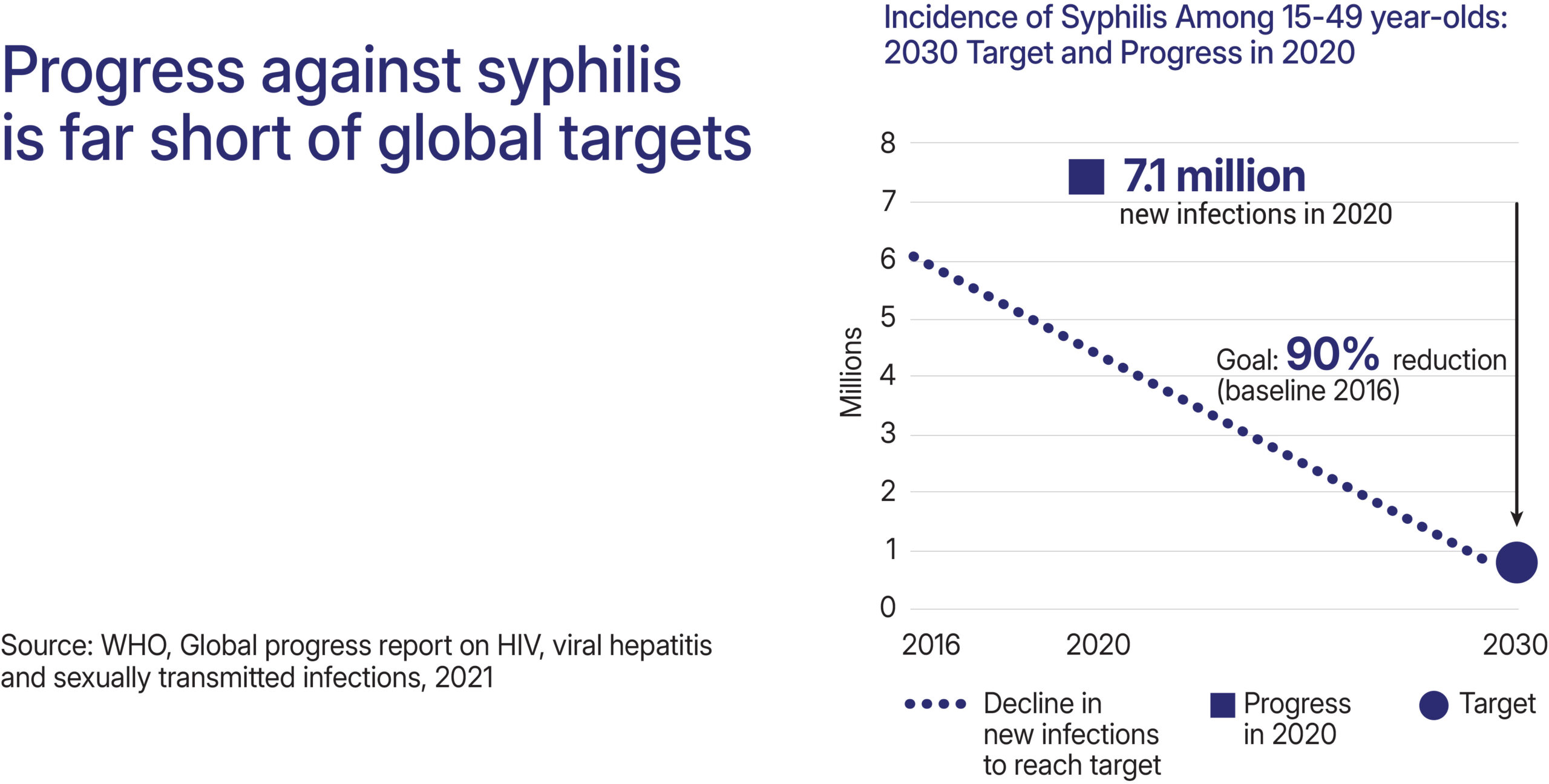Snapshot
- Syphilis can be transmitted through sex, close contact with a syphilitic sore, and during pregnancy.
- 8 million+ new cases occurred among adults and 700,000 among infants in 2022.
- Rates are increasing the fastest in Africa and the Americas.
- Syphilis during pregnancy may lead to stillbirth, newborn death, and babies born with syphilis.
- Syphilis also doubles risk for HIV acquisition and can cause severe brain and cardiovascular damage.
Key Challenges
- There’s no vaccine against syphilis, and R&D has struggled to progress past early stages.
- Missed opportunities for screening and inadequate prenatal care are driving a surge of congenital syphilis—the leading cause of stillbirth in low-income settings.
Syphilis Advocacy Needs
- Are vaccines available to prevent syphilis? No, but several clinical trials are being conducted to develop a syphilis vaccine.
- Are tests available to detect syphilis? Yes, rapid point-of-care and HIV/syphilis dual tests are available. Syphilis self-tests are also under development.
- How is syphilis detected? Blood sample, swab of lesion or sore, and through spinal fluid.
- Can syphilis be treated? Yes, but reinfections can occur.

Vaccines
While development of a syphilis vaccine has proven to be technically challenging, recent research has provided a more detailed picture of the bacteria that causes syphilis (Treponema pallidum, or TP), specifically its surface proteins. This is important because these proteins represent targets for potential vaccines. However, research remains in the preclinical stage.
A successful proof-of-concept study in an animal model suggests that a vaccine to prevent syphilis infection is feasible. Researchers are currently pursuing a two-pronged approach that would reduce syphilis transmission and also prevent the dissemination of syphilis bacteria through the bloodstream, to stop it from causing congenital infections and neurological damage.

Advocacy Needs
- More funding to advance R&D for syphilis vaccines is desperately needed: only $9 million is currently invested in this globally each year.
Diagnostics
Syphilis infections are usually diagnosed in the laboratory by examining a blood sample for antigens to TP, the bacteria that causes syphilis. TP can also be detected directly using darkfield microscopy, but this requires specialized equipment and training. Typically, however, syphilis infections go undiagnosed for many years, because it often has no noticeable symptoms. Routine screening and treatment of asymptomatic cases is essential to prevent future health consequences as well as transmission.
Encouragingly, several rapid tests have recently become available, including a dual HIV/syphilis rapid test available for less than $1 in low-income countries. Widespread use of these tests as part of prenatal care could play a major role in reducing miscarriages, stillbirths and health complications among newborns. Additionally, syphilis self-tests are starting to enter the market, offering more user-centered options for testing.

Advocacy Needs
- Use of affordable rapid POC tests needs to be scaled up to ensure that all pregnant people are adequately screened for syphilis and can receive treatment as needed.
- It is also important to make rapid testing available outside of prenatal care, so that other disproportionately affected groups can be diagnosed and treated.
Treatment
Syphilis can be cured with several commonly available antibiotics. The only recommended option for people who are pregnant is an injection of benzathine penicillin (BPG), which has been hit with frequent stock-outs in recent years. Outside of pregnancy, if BPG is unavailable providers can turn to other options including doxycycline, ceftriaxone, or azithromycin.
Advocacy Needs
- Governments must address BPG manufacturing and supply chain issues that threaten to leave pregnant people without timely treatment options.
- While syphilis remains susceptible to many antibiotics, research is needed to develop new treatment options that are safe during pregnancy.